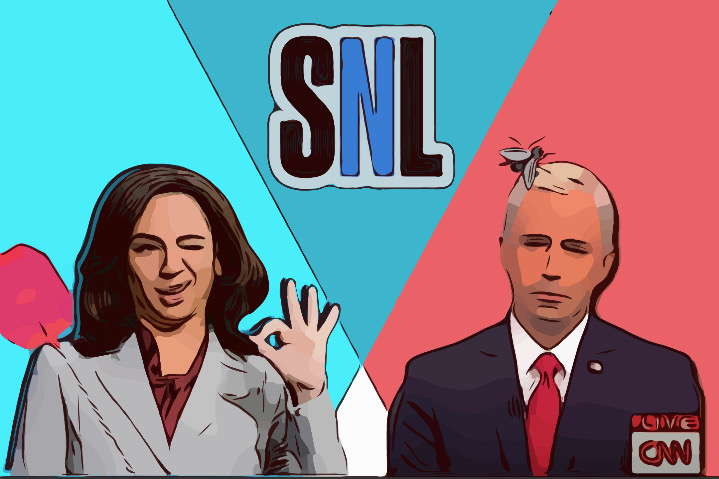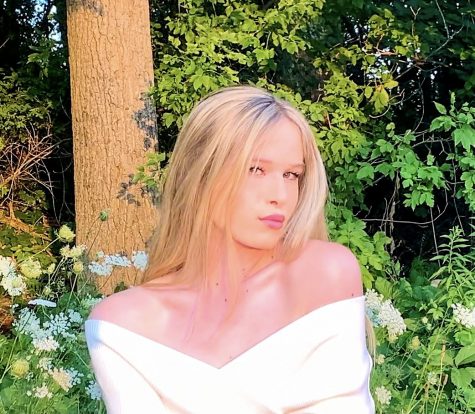Too real to laugh: Saturday Night Live romanticizes political chaos
I’m 17 years old, and I don’t like politics.
Yet here I am, deciding that my free time is best spent campaigning, phone-banking, knocking on doors, advocating for human rights, calling out ignorance, and tormenting my mental stability with every headline that crosses my path.
I can’t help it, I’m a transgender teenager who can’t change the channel. I have to watch my country continually oppress minority existence.
I have to like politics, even if it’s my long time nemesis that I can’t escape. Even if it’s my worst nightmare finally playing in 3D. Yes that’s the one, the car crash where I’m the driver, victim, and the bystander who can’t stop staring, the worst kind of rubber-neck, where you can’t stop watching your life crumble.
Concurrent with that reality is another:
I’m 17 years old, and I love to laugh.
Fortunately for a teen forced into obsession with their greatest foe, a perfect solution exists to fuse my nemesis, politics, and closest confidant, comedy: Saturday Night Live.

Beyond the thrills of live sketch comedy, the slew of thrilling celebrity hosts, and musical guests galore, SNL’s truest golden form lies in their political sketches. Since their 1975 premiere, the show has built a unique record of history spanning 45 years of parodying elections, presidential terms, and all things politics since Watergate itself.
Since sobbing on 2016’s election night, SNL political parodies have truly been a safe haven in my life and others around the world. Iconic performances from Kate Mckinnon’s Hillary Clinton and Alec Baldwin’s legendary Donald Trump have become great escapes for many. The viral nature of these SNL sketches has created an opportunity for viewers to replace their fears and anxieties about the political environment with laughter.
University of Connecticut professor Dr. Gina Barreca spoke on the connection between fear and humor for Psychology Today. “We can use humor to put our fears into perspective,” Barreca explained. “Humor is, of course, the one thing that fear cannot abide: Laughter banishes anxiety and can help replace fear. Laughter is a testament to courage, or at least a manifestation of the wish for it.”
While the practice of replacing fear with laughter provides an escape and ability to cope, I’ve noticed a problem. People aren’t just laughing at SNL parodies of presidential debates. They’re laughing at politics itself.
The Vice Presidential debate was one of the highest viewed in history. There is often less mainstream focus on the vice presidential candidates and their consequential debate, but 2020’s Vice Presidential contest between Senator Kamala Harris and Vice President Mike Pence was met with 57.9 million viewers according to the Los Angeles Times. This makes it only second and 11.7 million viewers behind 2008’s highest viewed vice presidential debate between Vice President Joe Biden and Governor Sarah Palin.
What exactly was in store for those 57.9 million viewers on that early October night was unprecedented. Vice President Mike Pence’s debate night went as follows: constant interrupting, ignoring the moderator’s time and questions, being consistently condescending, denying the existence of systematic racism, among other chaotic and divisive choices. Following the debate, the dominant point of discussion wasn’t Pence’s questionable performance, but rather the fly that had ironically landed on his head and stayed there for an impressive amount of time.
It was certainly somewhat amusing in the moment, but like any joke or fad, it vanished as quickly as the fly, and so did viewers’ focus and attention on the things that really mattered.
With the close of the real vice presidential debate, I was anticipating SNL’s parodied response, but the segment that premiered the following saturday night was anything but what I was expecting.
The red flags of concern weren’t far from view as the title was an alarming giveaway of SNL’s response to come: “VP Fly Debate Cold Open.”
Although I was apprehensive from the title alone, I remained optimistic as SNL hasn’t let me down before. I was still expecting excellent comedy writing that would shed light on some of the disturbing parts of the debate, and I anticipated clever and insightful jokes to satirize moments like Pence’s complete denial of systematic racism (along with a slew of many more offenses I was hoping would be creatively validated). I was caught off guard six minutes into the 13 minute sketch, when the comedy diverged from convoluted Pence jokes and the drawn out “cool auntie” Kamala jokes and dove head first into straight chaos.
The remaining 7 minutes were dedicated purely to the fly. It wasn’t even developed creatively, jumping ineffectively to Jim Carrey’s off-putting Biden character at home watching the debate and wishing to “spice” things up. What does Carrey’s Biden do? Well of course he jumps into his experimental teleportation machine, much to the obligatory concern of Jill Biden, and who happens to be with him? None other than a fly. This effectively caused Carrey’s Biden to save the day as the “transformed” fly at the debate. This was the cornerstone of the sketch, with the entire punchline taking up more than half of the runtime and being dedicated to a fly instead of an incredibly problematic vice presidential candidate.
I was let down in ways I had never foreseen. Of course this was simply a comedy sketch show, but all of their previous political sketch comedy had a message. It was intelligent, witty, and, with a depth far beyond humor, challenged viewers to see ideas and people in new ways. They had a phenomenal opportunity to do this with a historic debate, featuring the first ever female candidate in history, and instead they settled for badly written jokes, a teleportation farse, and apparently the most important fly in all of human history.
The reality is that even a comedy sketch program like SNL carries strong political power. With public trust of mainstream media eroding at an equal rate with the public’s capacity to handle anxiety and stress, I’m positive that there’s an embarrassing amount of people in the world that skipped the debates entirely just to watch the parodies on Saturday Night Live. There is a high level of influence in that alone.
I’ve begun to have conflicting feelings for my love to escape to media like SNL. As deeply as I appreciate the laughs and jokes, so much of this political climate is too real to laugh at. There’s too much at stake for the dominant takeaway from this entire debate to be a fly.
It is crucial to understand that responding to fearful situations with humor and comic relief is a way to cope, but it’s also incredibly damaging. When we laugh and accept our political leaders and administration as an ongoing comedy sketch, we begin to stop caring. We start to enter a mindset of “us vs. them” with the office that’s supposed to serve the American people, not work against them. When we view the federal injustice and failure as a joke, we only see it as entertainment. If we gawk and laugh at the facade of the wizard, we fail to see the man behind the curtain. Behind that curtain lies a misguided administration oppressing the daily lives of immigrants, LGBTQ+ communities, Black Americans, Muslims, people of color, impoverished communities, and so many more affected groups of real people. Nothing about that is funny.
If we continue mindlessly watching and laughing at our federal government instead of holding it accountable, we become complacent and forget the injustice at hand. As we escape our fears with laughter and misdirect our true emotions, we’re not just escaping our stress, we’re also escaping the truth.
I’m 17 years old, and I can’t stand politics but my obsession is unavoidable. I love to laugh, but I refuse to be mindlessly entertained any longer by things that perpetuate injustice while masquerading as comedy.

Senior Kylie Clifton is in her fourth year as a NL staff member. She is a co-editor in chief, having previously served the NL as both a business manager...





Malcolm Gaynor • Nov 22, 2020 at 11:53 am
I wish I could send this article directly to everyone working at SNL! Such a compelling article, incredibly well done and very thought provoking. It really puts into perspective the consequences of the election and how we cover it in a very unique way, great job!